|
|
|
Sort Order |
|
|
|
Items / Page
|
|
|
|
|
|
|
| Srl | Item |
| 1 |
ID:
110809


|
|
|
|
|
| Publication |
2012.
|
| Summary/Abstract |
Despite many claims by high-ranking policymakers and some scientists that climate change breeds violent conflict, the existing empirical literature has so far not been able to identify a systematic, causal relationship of this kind. This may either reflect de facto absence of such a relationship, or it may be the consequence of theoretical and methodological limitations of existing work. In this article we revisit the climate-conflict hypothesis along two lines. First, we concentrate on indirect effects of climatic conditions on conflict, whereas most of the existing literature focuses on direct effects. Specifically, we examine the causal pathway linking climatic conditions to economic growth and to armed conflict, and argue that the growth-conflict part of this pathway is contingent on the political system. Second, we employ a measure of climatic variability that has advantages over those used in the existing literature because it can presumably take into account the adaptation of production to persistent climatic changes. For the empirical analysis we use a global dataset for 1980-2004 and design the testing strategy tightly in line with our theory. Our empirical analysis does not produce evidence for the claim that climate variability affects economic growth. However, we find some, albeit weak, support for the hypothesis that non-democratic countries are more likely to experience civil conflict when economic conditions deteriorate.
|
|
|
|
|
|
|
|
|
|
|
|
|
|
|
|
| 2 |
ID:
162517
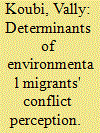

|
|
|
|
|
| Summary/Abstract |
Migration is likely to be a key factor linking climate change and conflict. However, our understanding of the factors behind and consequences of migration is surprisingly limited. We take this shortcoming as a motivation for our research and study the relationship between environmental migration and conflict at the micro level. In particular, we focus on environmental migrants' conflict perceptions. We contend that variation in migrants' conflict perception can be explained by the type of environmental event people experienced in their former home, whether gradual, and long-term or sudden-onset, short-term environmental changes. We develop this argument before quantitatively analyzing newly collected micro-level data on intra-state migration from five developing countries. The results emphasize that migrants who experienced gradual, long-term environmental events in their former homes are more likely to perceive conflict in their new location than those having experienced sudden, short-term environmental events. These findings are in line with our theoretical argument that environmental migrants who suffer from environmentally induced grievances are ultimately more likely to perceive conflict and challenges in their new locations.
|
|
|
|
|
|
|
|
|
|
|
|
|
|
|
|
| 3 |
ID:
128869


|
|
|
|
|
| Publication |
2014.
|
| Summary/Abstract |
This article reviews the existing theoretical arguments and empirical findings linking renewable and non-renewable natural resources to the onset, intensity, and duration of intrastate as well as interstate armed conflict. Renewable resources are supposedly connected to conflict via scarcity, while non-renewable resources are hypothesized to lead to conflict via resource abundance. Based upon our analysis of these two streams in the literature, it turns out that the empirical support for the resource scarcity argument is rather weak. However, the authors obtain some evidence that resource abundance is likely to be associated with conflict. The article concludes that further research should generate improved data on low-intensity forms of conflict as well as resource scarcity and abundance at subnational and international levels, and use more homogenous empirical designs to analyze these data. Such analyses should pay particular attention to interactive effects and endogeneity issues in the resource-conflict relationship.
|
|
|
|
|
|
|
|
|
|
|
|
|
|
|
|
| 4 |
ID:
091726
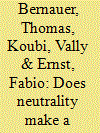

|
|
|
| 5 |
ID:
178644
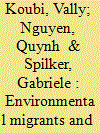

|
|
|
|
|
| Summary/Abstract |
The displacement of people due to climatic changes (environmental migration) presents major societal and governance challenges. This article examines whether and how climate-induced rural-to-urban migration contributes to social-movement participation. We argue that the mainly forceful nature of relocation makes environmental migrants more likely to join and participate in social movements that promote migrant rights in urban areas. Using original survey data from Kenya, we find that individuals who had experienced several different types of severe climatic events at their previous location are more likely to join and participate in social movements. This finding has important policy implications. National and local authorities should not only provide immediate assistance and basic social services to environmental migrants in urban settings, but also facilitate permanent solutions by fostering their socio-economic and political integration in order to prevent urban conflict.
|
|
|
|
|
|
|
|
|
|
|
|
|
|
|
|
| 6 |
ID:
128854
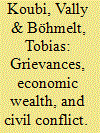

|
|
|
|
|
| Publication |
2014.
|
| Summary/Abstract |
One of the most robust findings in the literature on civil conflicts is that high income levels are associated with a lower risk of conflict onset. This article addresses the wealth-conflict link and discusses it in relation to the dominating `greed vs. grievance' dichotomy. It is further argued that the effect on conflict of grievances, in the form of horizontal inequalities, is conditioned on national wealth. More specifically, there may be a higher risk of civil war in those countries that have much wealth, but where a large share of the population is potentially excluded from accessing it. The empirical analyses testing this argument employ time-series cross-section data for 1951-2004 and find support for the theory. The authors also show that taking this conditional relationship into account improves our ability to predict the onset of civil conflict.
|
|
|
|
|
|
|
|
|
|
|
|
|
|
|
|
| 7 |
ID:
090135
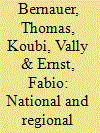

|
|
|
|
|
| Publication |
2009.
|
| Summary/Abstract |
The effects of defense spending on economic performance and, in particular, on economic growth have been studied extensively in the literature. The empirical findings have been ambiguous so far, partly reflecting the econometric difficulties involved in the estimation of this relationship. The authors study the implications of Swiss defense spending for economic growth and unemployment in Switzerland, using both national aggregate and cross-sectional (cantonal) data. Such analysis may be more informative than similar analyses that rely on time series for individual countries (due to spurious time effects) or averages for different countries (due to strong cross country variation in country characteristics). The findings indicate that although defense spending has had a positive effect on the rate of economic growth of Switzerland in the presence of an external threat (Cold War), the distribution of defense spending across cantons has not contributed to the dispersion of cantonal growth rates. Nonetheless, cantons in which military employment is a large share of total employment have enjoyed lower and more stable unemployment rates. These findings suggest that in order to uncover the full implications of defense spending, it is necessary to go beyond the defense spending-growth nexus. The findings seem relevant for many other countries because the allocation of national defense employment and spending is rarely uniform across the regions of any country.
|
|
|
|
|
|
|
|
|
|
|
|
|
|
|
|
| 8 |
ID:
059897


|
|
|
|
|
|
|
|